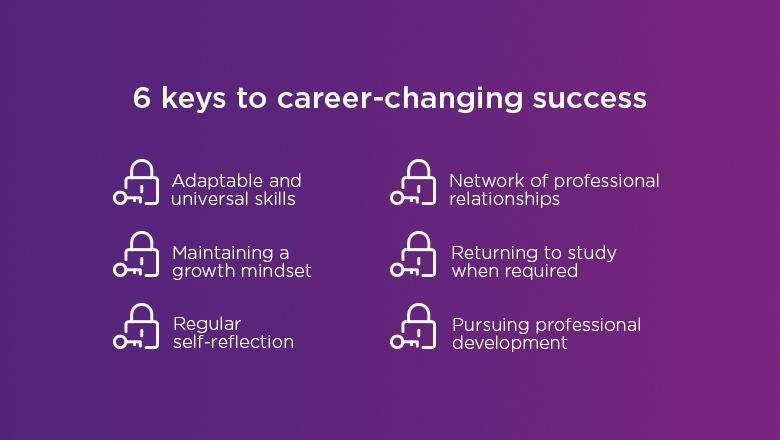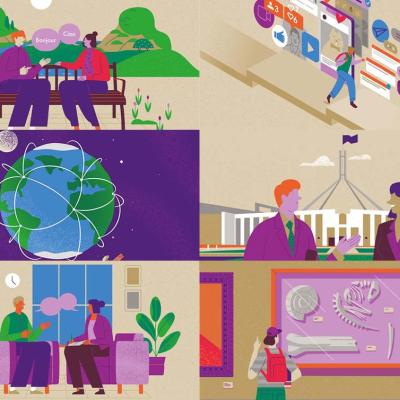The days of graduating from university and settling into a single job for the rest of your days are long gone. It’s now more common than ever for people in Australia – and around the world – to have several career changes on their resumés.
But just how many times do people change careers? And how many jobs will Gen Z have in their lifetime compared to millennials and previous generations?
Let’s dive into some data to discover:
- how many careers the average person has
- why people change careers so much
- what you can do to prepare for a life of various jobs.
Job vs career: A job usually refers to a specific position you hold with an employer. A career means an ongoing profession and can include any number of jobs within a particular field or line of work. For example, being a Copywriter at The University of Queensland is a job, whereas writing digital content is a career.
How many jobs in a lifetime?
Most people remain in the workforce for around 45 years (typically from their early 20s to their mid-60s), and the average person changes jobs ever 2 years and 9 months. So, you could easily accumulate around 16 jobs on your resumé before you retire.
Of course, this may vary quite a bit due to factors like the industry (or industries) you work in, your personal circumstances, and your level of education. For example, having a bachelor’s degree or a higher qualification tends to lead to more job opportunities – and more opportunities to change careers as you please.
Keep in mind that not everyone considers a “job” to be the same thing. A freelancing gig or casual part-time role may count as a job in some people’s view. But others may only deem full-time, permanent positions to be jobs.

How many careers in a lifetime?
Changing jobs can be as simple as getting promoted to a new title or taking a similar role at another company. A career change, on the other hand, usually means jumping into a new type of work altogether and even switching into a different field or industry.
And while this is more intense than a job change, it still happens more often than you might expect.
Research shows most people will change careers at least once in their lives. In fact, the average person tends to go through 3-7 careers before they retire, and this number may be more like 5-7 for the current and upcoming generations of workers.
Why do people change careers so much?
Some of the most common reasons people will move from one job or career to the next include:
- to pursue a better opportunity (this could mean better pay and/or more fulfilling work)
- to get away from a toxic work environment or industry
- to find a job with more room for growth or progression
- to get away from a specific boss or manager
- due to being dismissed or made redundant.
The job-hopping generation gap
Both anecdotally and statistically, Millennials and Gen Zers have a reputation for skipping from one job to the next more frequently than prior generations. Experts suggest a couple of potential reasons for this trend, including:
- Modern workplace culture is less focused on employee loyalty than before.
- Younger workers want to explore a wider range of industries and career opportunities, and they’re less interested in workplace longevity.
- Not attaching themselves to one organisation allows young workers more flexibility to work multiple roles including side hustles.
- Some industries underpay younger workers, leading them to seek out higher-paid opportunities as quickly as they can.
So, how do you prepare for a life of varied careers?
If you’re expected to have up to 7 different careers in your lifetime, how can you set yourself up for success in all of them?
The first trick is to have a diverse and somewhat universal skillset. For some people, this means choosing a university program that will equip them with a combination of the skills they’ll need for a specific industry and skills that will help them thrive in any industry. This is what makes programs like the Bachelor of Arts (BA) so relevant for the contemporary workforce – you get to mix and match your study areas to graduate with a versatile range of knowledge and abilities.
Many majors in the Bachelor of Arts can help prepare you for every career you might have. For example, the Writing major can help you communicate effectively in any job, while studying another language can quite literally open a new world of career opportunities.
For many BA graduates, the most valuable thing learnt in the program is the power of critical thinking. In a world where machines are getting better at doing the what, it’s never been more important for uni graduates to understand the why.

Once you’re working, there are several things you can do to stay ready for any career changes you might make:
- Maintain a growth mindset. Try to view any challenges you come across as opportunities to learn rather than obstacles to your progress. This approach to problems will help you become resilient and adaptable – two traits that are valuable in any career and helpful when changing careers.
- Reflect on your life and career often. Taking regular time out to check in on your feelings about your current role (e.g. whether you’re fulfilled and engaged by the job and whether the work you’re doing aligns with your passions) can help you identify when it’s time to make a move.
- Cherish and nurture professional relationships. A solid network of professional contacts can prove very useful when making career changes. Consider that any colleague you work with may be on a career path just as diverse as yours, so you never know when your paths may cross again. Maintaining genuine relationships with peers and mentors may open future doors that otherwise would’ve been locked.
- Go back to study if you need to. Postgraduate study doesn’t just exist to keep university professors busy. Sometimes your universal skills and growth mindset won’t quite be enough to switch into a better career, so you may need to return to uni to get the specific skills and qualifications you need to progress.
- Take advantage of professional development. When your employer(s) make learning opportunities available to you, don’t miss out on them. Broadening your capabilities and keeping your knowledge current is key to making career changes. Professional development in out-of-the-box areas could even provide the spark to inspire your next leap.
The idea of having up to 7 careers in your life can feel intimidating, especially when you’re just trying to choose a degree and find your first job right now. But over the years, you might be surprised by just how naturally you’ll step from one career to the next – especially if you have a versatile education and a positive attitude to back you up.
Prepare for a series of successful careers with a UQ Bachelor of Arts.





